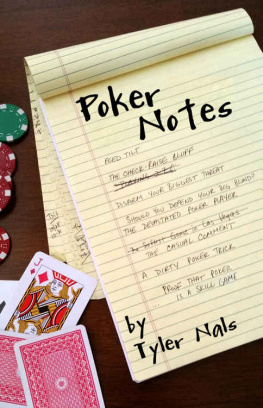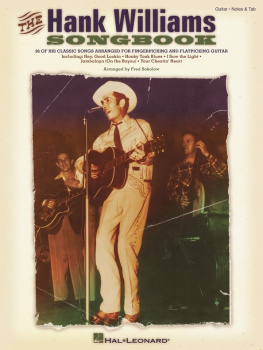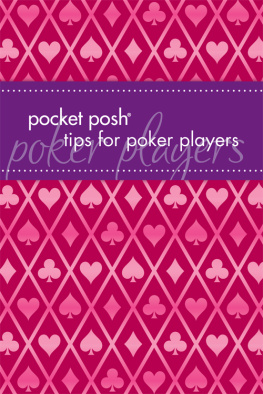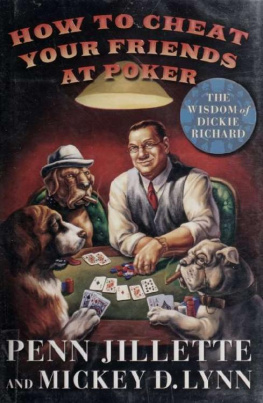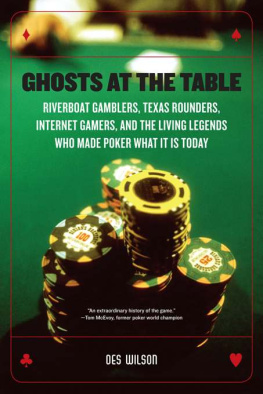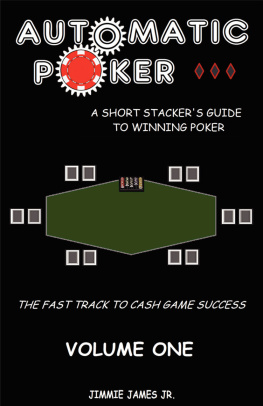Joe Williams - Poker Notes
Here you can read online Joe Williams - Poker Notes full text of the book (entire story) in english for free. Download pdf and epub, get meaning, cover and reviews about this ebook. year: 2014, publisher: Tyler Nals, genre: Romance novel. Description of the work, (preface) as well as reviews are available. Best literature library LitArk.com created for fans of good reading and offers a wide selection of genres:
Romance novel
Science fiction
Adventure
Detective
Science
History
Home and family
Prose
Art
Politics
Computer
Non-fiction
Religion
Business
Children
Humor
Choose a favorite category and find really read worthwhile books. Enjoy immersion in the world of imagination, feel the emotions of the characters or learn something new for yourself, make an fascinating discovery.
- Book:Poker Notes
- Author:
- Publisher:Tyler Nals
- Genre:
- Year:2014
- Rating:4 / 5
- Favourites:Add to favourites
- Your mark:
- 80
- 1
- 2
- 3
- 4
- 5
Poker Notes: summary, description and annotation
We offer to read an annotation, description, summary or preface (depends on what the author of the book "Poker Notes" wrote himself). If you haven't found the necessary information about the book — write in the comments, we will try to find it.
Poker Notes — read online for free the complete book (whole text) full work
Below is the text of the book, divided by pages. System saving the place of the last page read, allows you to conveniently read the book "Poker Notes" online for free, without having to search again every time where you left off. Put a bookmark, and you can go to the page where you finished reading at any time.
Font size:
Interval:
Bookmark:
Poker Notes
By
Tyler Nals
2014 Tyler Nals
All rights reserved. This book or any portion thereof may not be reproduced or used in any manner whatsoever without the express written permission of the publisher except for the use of brief quotations in a book review.
Contents
You have been ridiculed by family and friends. You know that some people secretly refer to you as a loser or degenerate. Its irritating, but you play on because youre passion for the game is deep and cant be contained. You understand that life is short. Therefore, why not do something you enjoy? Heres the brutal truth, though.
Theres a 90% chance that youre a financial loser in the game of poker. Thats the bad news. What makes it even worse is that you might be proving some naysayers correct. The good news is that you can turn that trend around. And, yes, you can do that be reading this book. Before you get started, there are a few things you should know about me and this book.
This book is not for professional players. Its for beginner and intermediate players who are sick of losing and eager to turn the tables on their foes. If you read The Dark Side of the Felt , then you know a little bit about me. Im not the best poker player in the universe, but Im profitable (by a wide margin), which puts me in the top 10%. If youre familiar with the game, then you might find some of the concepts in this book to be unique. Everything has been learned through years of trial and error. Keep in mind that you might not agree with everything thats written here, but I only have one goal: Profits!
After reading the following information, you might think this book should be titled Evil Poker . Thats understandable. However, its not evil; its a strategy for a game. And in this fine game of poker, every player at your table is attempting to take your money. Therefore, any tactic available to you should be implemented at the right times. Attempting to protect your money, or attempting to acquire money by any means necessary on the felt to pay bills and feed your family isnt evil its moral.
Down On His Luck
A lot of poker players make the mistake of playing table games against the house. Dont dissuade them. These are players you want at your table. If they were winning at the table games, then they would still be at the table games. If theyre at your poker table, then they likely lost at the table games and are attempting to switch things up. What they dont realize is that theyre on tilt before they even sit down.
If youre a nice fellow, you could comfort this person after he announces he just got crushed in blackjack or roulette. You could offer justifications for the loss and make him feel better, putting some crazy positive spin on the chain of events that have unfolded for him. But this would be unwise, and when youre playing poker, you dont want to be a nice fellow.
Instead of taking the approach mentioned above, offer a casual needle or two, which will add to his tilt and increase his impatience once he begins playing poker. For instance, with a gentle laugh, you can say something along the lines of, Oh, no, you made the mistake of playing blackjack here? Nobody wins at blackjack here. This is sure to make him feel worse, not better. Use your own personality and change the wording around. As long as it sounds sincere but is really designed to feed tilt, you will be good to go.
Painful Lies
Moving on to another cruel poker tactic, lets say youre heads-up in a hand with another player. You make a big bet on the river and your opponent folds. Youre 100% sure you had the winner, but your opponent doesnt need to know that. Instead, muck your cards and say, What did you have there? He will tell you and then expect you to tell him he was beat. But its time to feed tilt. Instead, base your answer on his response and make your hand slightly weaker than the hand he said he had.
For example, if says he had top pair with a king kicker, you should react with slight surprise and tell him you had top pair with a queen kicker. This wont be true, but thats not the point. The point is that youre going to see this character go on tilt in an instant, especially if it was a big pot. If it doesnt work, wait a few orbits and use the same tactic. This time, tell him that your hand was a few levels lower than his. Remember, hes there to take your money, and youre not there to make friends.
The Job Ploy
If youre having trouble getting your poker neighbor guy sitting next to you on tilt, this is a surefire way to do it. Strike up a conversation with that fellow and ask him what he does for a living. Once he replies, hes doomed.
Nobody likes talking about work when theyre playing poker. The game of poker is an escapist activity. Part of the reason we play is to forget about stress. Logically, if you bring up stressful aspects of life to someone who is there to relax, theyre going to get frustrated.
Try to gear the conversation toward the negatives that person experiences at work. Act like a psychologist by comforting him, but at the same time, be sure to add some, Oh, that stinks and I wouldnt be able to deal with someone like that. Youre putting negative thoughts in his mind, which will affect his mood and game.
Obvious Tilt Weapons
Lets not forget the easiest ways to get someone on tilt:
Show your bluff after your opponent folds.
After hitting a hand and beating your opponent, tell him you only called for some crazy reason (i.e. you only played 97o because you wore 97 on the football team in high school).
After sucking out on your opponent, remind him that you only had two outs (or whatever number of outs apply).
Tell him that the seat hes sitting in is known as unlucky or has been cold all day.
Tell him hes an awesome poker player (this will put pressure on him to make all the correct decisions, which is often highly effective).
Tell the chip leader in a poker tournament that hes on fire and hitting everything (he will see this as bad luck, and it almost always lead to reduced concentration and chip declines).
While I dont believe this to be true in real life off the felt, in the game of poker, its better to be feared than loved.
Welcome to the profitable side of the felt! But this is just the beginning.
If you dont keep track of your winning and losing poker sessions, then youre probably a losing player. Before you jump down my throat for making such an accusation, at least hear what I have to say.
Human Nature
Whether you want to admit it or not, its normal for gamblers to only focus on their wins while justifying their losses. In my opinion, profitable poker players arent gamblers because they practice money management, implement effective poker strategies, and keep track of all their session performances. Those who dont practice money management, play recklessly, and dont bother to keep track of their session performances can be classified as gamblers. Theres a difference between poker players and gamblers, and only about 10% of the people you see in a poker room are real poker players. The others just like to think they fall into that category.
Why Poker Records Are Important
The first reason keeping track of your sessions is important is simply because it lets you know if youre a profitable player or not. If you are, then you should keep playing. If youre not, then you need to stop playing, make some adjustments, and give it another go. If you still cant win after a few years and multiple adjustments, then you should probably give up the game.
The second reason keeping track of your sessions is important is to increase your profitability. For example, if you play 18 live sessions on Wednesday nights and youre 8-10 and down $1,300, then you shouldnt play at that poker room on Wednesday nights. If you play 18 sessions at the same poker room on Saturday nights and youre 10-8 and up $3,100, then you should keep playing on Saturday nights.
Font size:
Interval:
Bookmark:
Similar books «Poker Notes»
Look at similar books to Poker Notes. We have selected literature similar in name and meaning in the hope of providing readers with more options to find new, interesting, not yet read works.
Discussion, reviews of the book Poker Notes and just readers' own opinions. Leave your comments, write what you think about the work, its meaning or the main characters. Specify what exactly you liked and what you didn't like, and why you think so.

